Public Health: Mental Health and Alcoholism in the UK Report
VerifiedAdded on 2021/02/21
|14
|4572
|425
Report
AI Summary
This report provides a comprehensive analysis of public health challenges, particularly those related to alcoholism and its impact on mental health within the United Kingdom. It begins with an introduction to public health principles and the role of the NHS, then delves into an evaluation of the public health agenda at local, national, and international levels, focusing on the prevalence and effects of alcoholism. The report examines the history of alcoholism, its psychological consequences, and its societal impact, including the role of government and NHS in addressing these issues. It also critically assesses current health reforms, policy strategies, and their implications for health and social care commissioning and service delivery. Furthermore, the report explores inter-agency and inter-professional partnership working, ethical implications of health policy, and the factors contributing to the overall health of the population. The report concludes by summarizing key findings and recommendations for improving public health outcomes related to alcoholism and mental health.
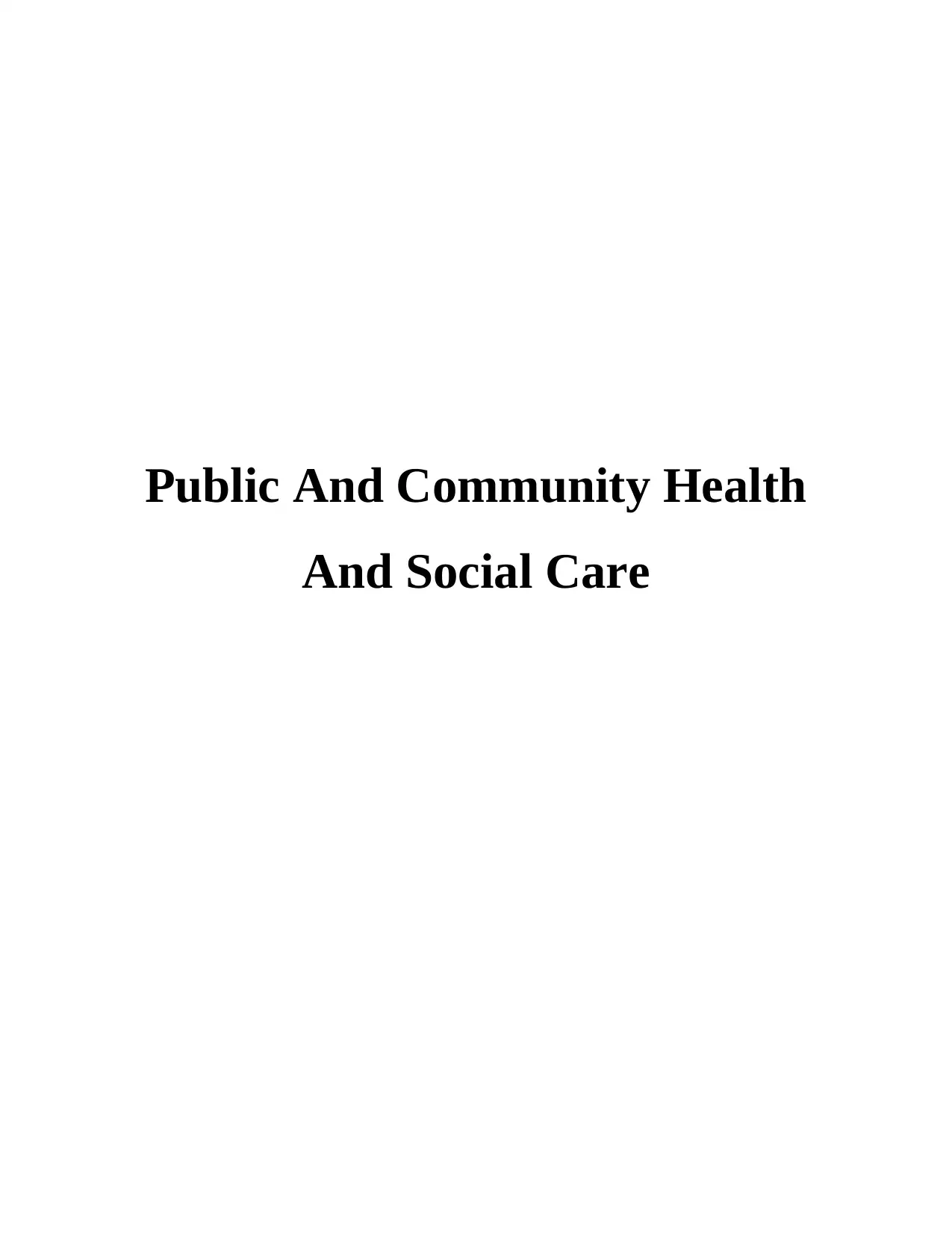
Public And Community Health
And Social Care
And Social Care
Paraphrase This Document
Need a fresh take? Get an instant paraphrase of this document with our AI Paraphraser
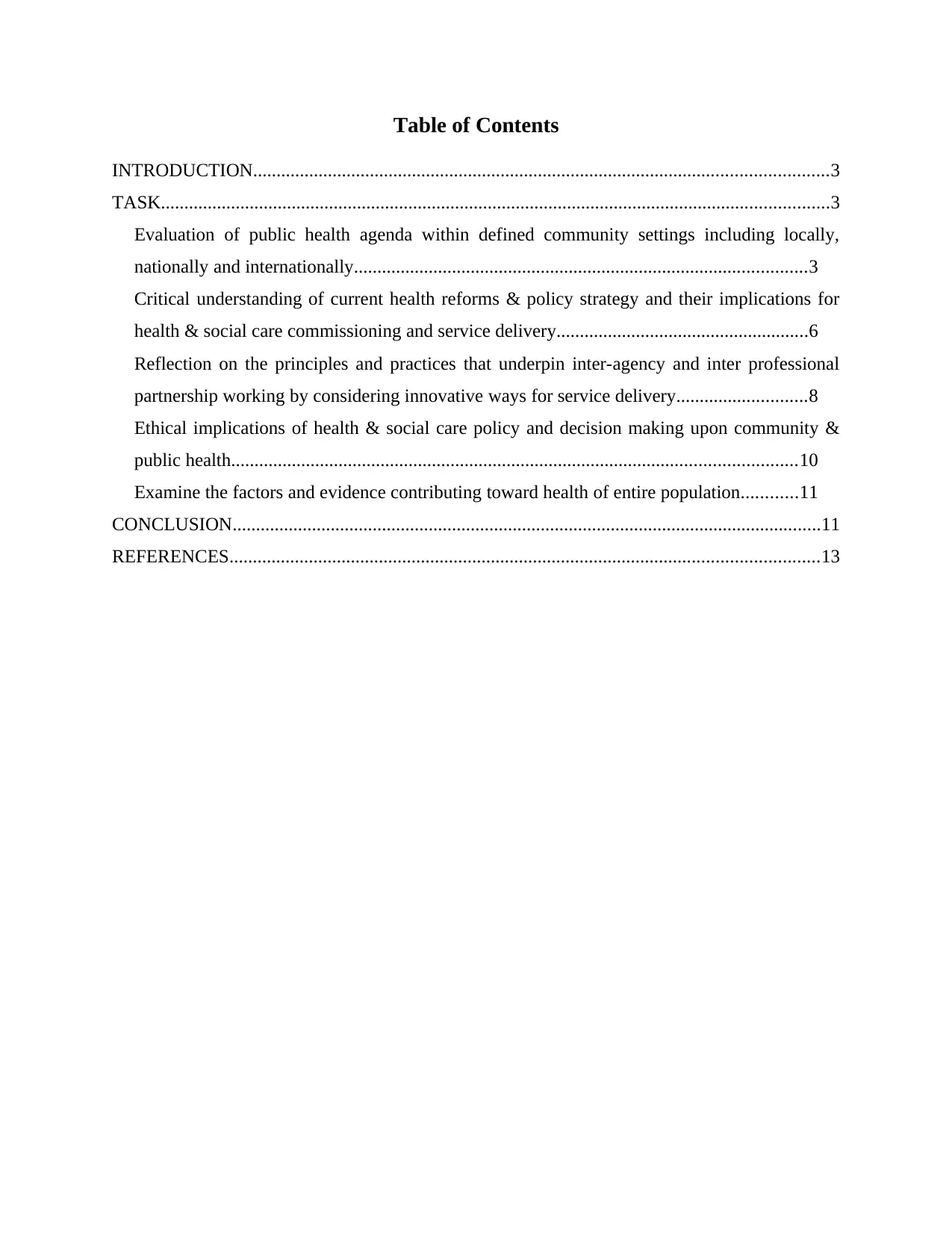
Table of Contents
INTRODUCTION...........................................................................................................................3
TASK...............................................................................................................................................3
Evaluation of public health agenda within defined community settings including locally,
nationally and internationally.................................................................................................3
Critical understanding of current health reforms & policy strategy and their implications for
health & social care commissioning and service delivery......................................................6
Reflection on the principles and practices that underpin inter-agency and inter professional
partnership working by considering innovative ways for service delivery............................8
Ethical implications of health & social care policy and decision making upon community &
public health.........................................................................................................................10
Examine the factors and evidence contributing toward health of entire population............11
CONCLUSION..............................................................................................................................11
REFERENCES..............................................................................................................................13
INTRODUCTION...........................................................................................................................3
TASK...............................................................................................................................................3
Evaluation of public health agenda within defined community settings including locally,
nationally and internationally.................................................................................................3
Critical understanding of current health reforms & policy strategy and their implications for
health & social care commissioning and service delivery......................................................6
Reflection on the principles and practices that underpin inter-agency and inter professional
partnership working by considering innovative ways for service delivery............................8
Ethical implications of health & social care policy and decision making upon community &
public health.........................................................................................................................10
Examine the factors and evidence contributing toward health of entire population............11
CONCLUSION..............................................................................................................................11
REFERENCES..............................................................................................................................13

⊘ This is a preview!⊘
Do you want full access?
Subscribe today to unlock all pages.

Trusted by 1+ million students worldwide
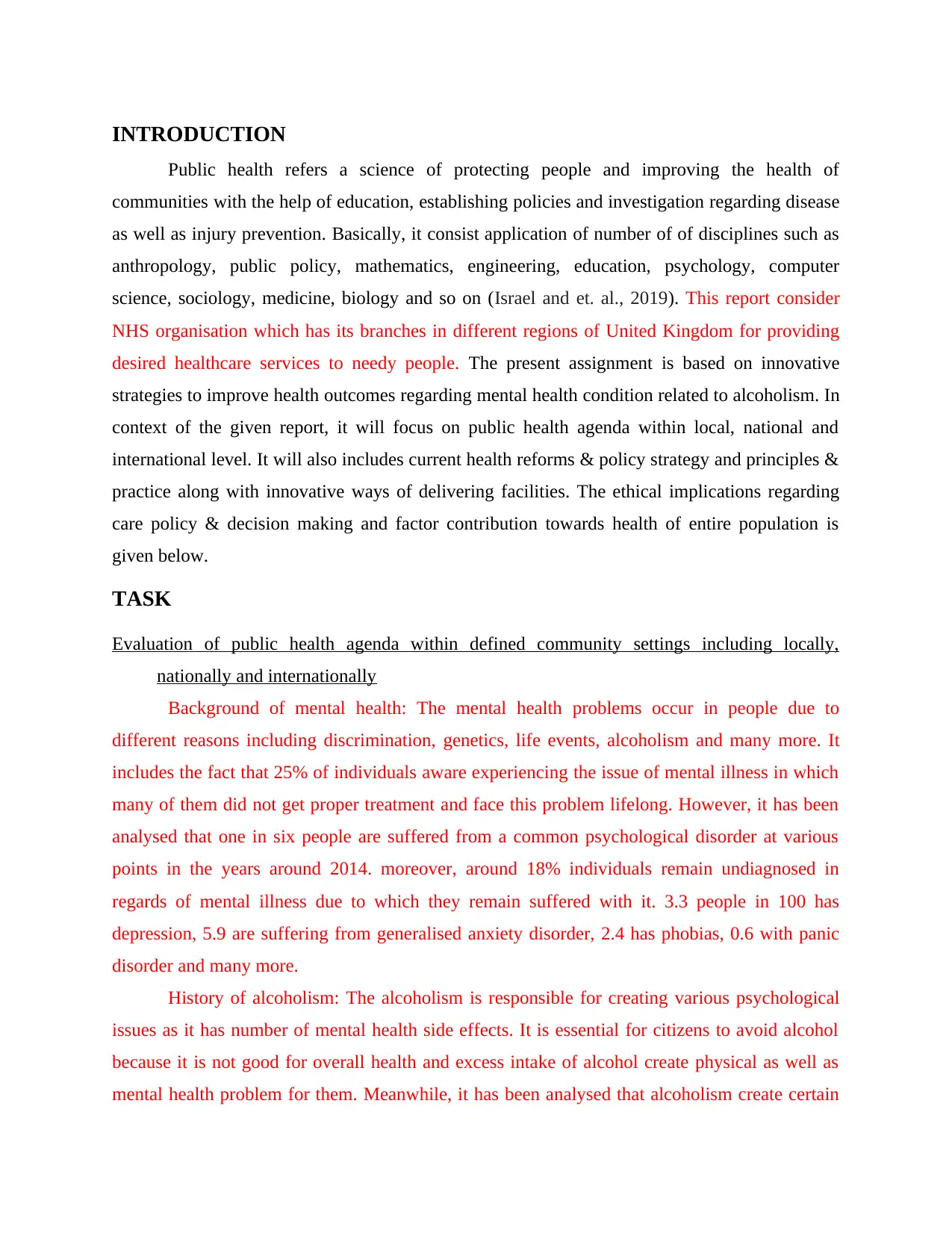
INTRODUCTION
Public health refers a science of protecting people and improving the health of
communities with the help of education, establishing policies and investigation regarding disease
as well as injury prevention. Basically, it consist application of number of of disciplines such as
anthropology, public policy, mathematics, engineering, education, psychology, computer
science, sociology, medicine, biology and so on (Israel and et. al., 2019). This report consider
NHS organisation which has its branches in different regions of United Kingdom for providing
desired healthcare services to needy people. The present assignment is based on innovative
strategies to improve health outcomes regarding mental health condition related to alcoholism. In
context of the given report, it will focus on public health agenda within local, national and
international level. It will also includes current health reforms & policy strategy and principles &
practice along with innovative ways of delivering facilities. The ethical implications regarding
care policy & decision making and factor contribution towards health of entire population is
given below.
TASK
Evaluation of public health agenda within defined community settings including locally,
nationally and internationally
Background of mental health: The mental health problems occur in people due to
different reasons including discrimination, genetics, life events, alcoholism and many more. It
includes the fact that 25% of individuals aware experiencing the issue of mental illness in which
many of them did not get proper treatment and face this problem lifelong. However, it has been
analysed that one in six people are suffered from a common psychological disorder at various
points in the years around 2014. moreover, around 18% individuals remain undiagnosed in
regards of mental illness due to which they remain suffered with it. 3.3 people in 100 has
depression, 5.9 are suffering from generalised anxiety disorder, 2.4 has phobias, 0.6 with panic
disorder and many more.
History of alcoholism: The alcoholism is responsible for creating various psychological
issues as it has number of mental health side effects. It is essential for citizens to avoid alcohol
because it is not good for overall health and excess intake of alcohol create physical as well as
mental health problem for them. Meanwhile, it has been analysed that alcoholism create certain
Public health refers a science of protecting people and improving the health of
communities with the help of education, establishing policies and investigation regarding disease
as well as injury prevention. Basically, it consist application of number of of disciplines such as
anthropology, public policy, mathematics, engineering, education, psychology, computer
science, sociology, medicine, biology and so on (Israel and et. al., 2019). This report consider
NHS organisation which has its branches in different regions of United Kingdom for providing
desired healthcare services to needy people. The present assignment is based on innovative
strategies to improve health outcomes regarding mental health condition related to alcoholism. In
context of the given report, it will focus on public health agenda within local, national and
international level. It will also includes current health reforms & policy strategy and principles &
practice along with innovative ways of delivering facilities. The ethical implications regarding
care policy & decision making and factor contribution towards health of entire population is
given below.
TASK
Evaluation of public health agenda within defined community settings including locally,
nationally and internationally
Background of mental health: The mental health problems occur in people due to
different reasons including discrimination, genetics, life events, alcoholism and many more. It
includes the fact that 25% of individuals aware experiencing the issue of mental illness in which
many of them did not get proper treatment and face this problem lifelong. However, it has been
analysed that one in six people are suffered from a common psychological disorder at various
points in the years around 2014. moreover, around 18% individuals remain undiagnosed in
regards of mental illness due to which they remain suffered with it. 3.3 people in 100 has
depression, 5.9 are suffering from generalised anxiety disorder, 2.4 has phobias, 0.6 with panic
disorder and many more.
History of alcoholism: The alcoholism is responsible for creating various psychological
issues as it has number of mental health side effects. It is essential for citizens to avoid alcohol
because it is not good for overall health and excess intake of alcohol create physical as well as
mental health problem for them. Meanwhile, it has been analysed that alcoholism create certain
Paraphrase This Document
Need a fresh take? Get an instant paraphrase of this document with our AI Paraphraser
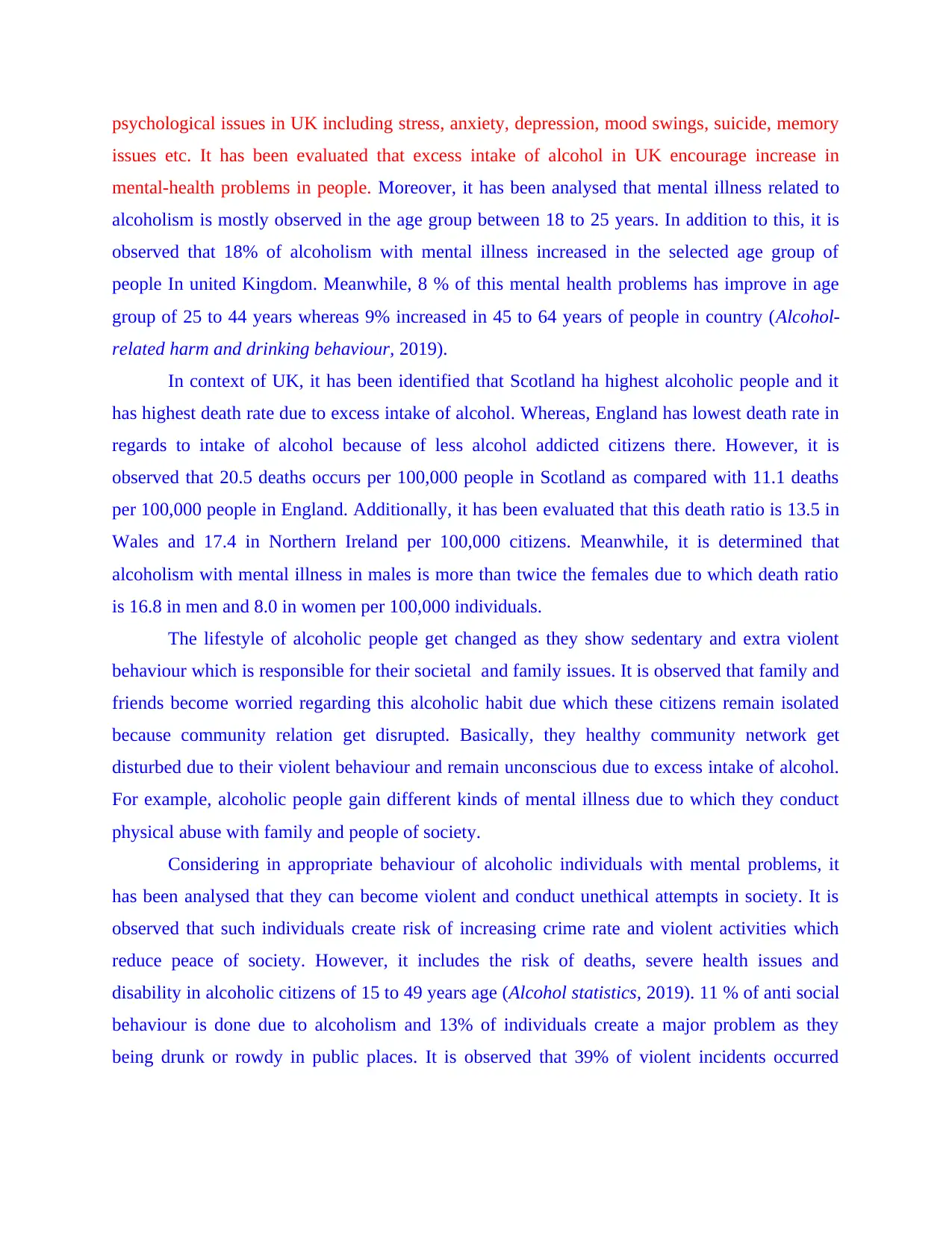
psychological issues in UK including stress, anxiety, depression, mood swings, suicide, memory
issues etc. It has been evaluated that excess intake of alcohol in UK encourage increase in
mental-health problems in people. Moreover, it has been analysed that mental illness related to
alcoholism is mostly observed in the age group between 18 to 25 years. In addition to this, it is
observed that 18% of alcoholism with mental illness increased in the selected age group of
people In united Kingdom. Meanwhile, 8 % of this mental health problems has improve in age
group of 25 to 44 years whereas 9% increased in 45 to 64 years of people in country (Alcohol-
related harm and drinking behaviour, 2019).
In context of UK, it has been identified that Scotland ha highest alcoholic people and it
has highest death rate due to excess intake of alcohol. Whereas, England has lowest death rate in
regards to intake of alcohol because of less alcohol addicted citizens there. However, it is
observed that 20.5 deaths occurs per 100,000 people in Scotland as compared with 11.1 deaths
per 100,000 people in England. Additionally, it has been evaluated that this death ratio is 13.5 in
Wales and 17.4 in Northern Ireland per 100,000 citizens. Meanwhile, it is determined that
alcoholism with mental illness in males is more than twice the females due to which death ratio
is 16.8 in men and 8.0 in women per 100,000 individuals.
The lifestyle of alcoholic people get changed as they show sedentary and extra violent
behaviour which is responsible for their societal and family issues. It is observed that family and
friends become worried regarding this alcoholic habit due which these citizens remain isolated
because community relation get disrupted. Basically, they healthy community network get
disturbed due to their violent behaviour and remain unconscious due to excess intake of alcohol.
For example, alcoholic people gain different kinds of mental illness due to which they conduct
physical abuse with family and people of society.
Considering in appropriate behaviour of alcoholic individuals with mental problems, it
has been analysed that they can become violent and conduct unethical attempts in society. It is
observed that such individuals create risk of increasing crime rate and violent activities which
reduce peace of society. However, it includes the risk of deaths, severe health issues and
disability in alcoholic citizens of 15 to 49 years age (Alcohol statistics, 2019). 11 % of anti social
behaviour is done due to alcoholism and 13% of individuals create a major problem as they
being drunk or rowdy in public places. It is observed that 39% of violent incidents occurred
issues etc. It has been evaluated that excess intake of alcohol in UK encourage increase in
mental-health problems in people. Moreover, it has been analysed that mental illness related to
alcoholism is mostly observed in the age group between 18 to 25 years. In addition to this, it is
observed that 18% of alcoholism with mental illness increased in the selected age group of
people In united Kingdom. Meanwhile, 8 % of this mental health problems has improve in age
group of 25 to 44 years whereas 9% increased in 45 to 64 years of people in country (Alcohol-
related harm and drinking behaviour, 2019).
In context of UK, it has been identified that Scotland ha highest alcoholic people and it
has highest death rate due to excess intake of alcohol. Whereas, England has lowest death rate in
regards to intake of alcohol because of less alcohol addicted citizens there. However, it is
observed that 20.5 deaths occurs per 100,000 people in Scotland as compared with 11.1 deaths
per 100,000 people in England. Additionally, it has been evaluated that this death ratio is 13.5 in
Wales and 17.4 in Northern Ireland per 100,000 citizens. Meanwhile, it is determined that
alcoholism with mental illness in males is more than twice the females due to which death ratio
is 16.8 in men and 8.0 in women per 100,000 individuals.
The lifestyle of alcoholic people get changed as they show sedentary and extra violent
behaviour which is responsible for their societal and family issues. It is observed that family and
friends become worried regarding this alcoholic habit due which these citizens remain isolated
because community relation get disrupted. Basically, they healthy community network get
disturbed due to their violent behaviour and remain unconscious due to excess intake of alcohol.
For example, alcoholic people gain different kinds of mental illness due to which they conduct
physical abuse with family and people of society.
Considering in appropriate behaviour of alcoholic individuals with mental problems, it
has been analysed that they can become violent and conduct unethical attempts in society. It is
observed that such individuals create risk of increasing crime rate and violent activities which
reduce peace of society. However, it includes the risk of deaths, severe health issues and
disability in alcoholic citizens of 15 to 49 years age (Alcohol statistics, 2019). 11 % of anti social
behaviour is done due to alcoholism and 13% of individuals create a major problem as they
being drunk or rowdy in public places. It is observed that 39% of violent incidents occurred
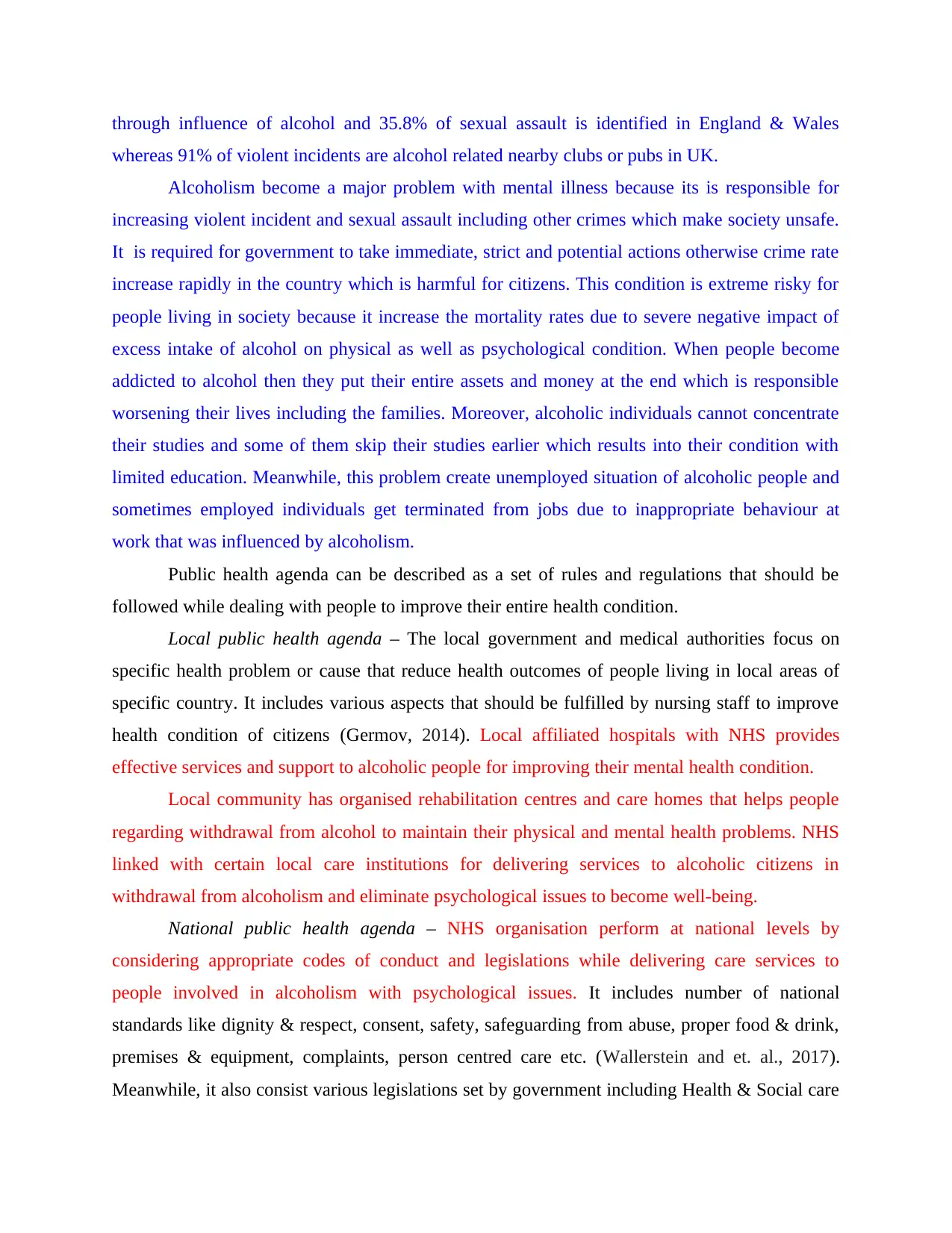
through influence of alcohol and 35.8% of sexual assault is identified in England & Wales
whereas 91% of violent incidents are alcohol related nearby clubs or pubs in UK.
Alcoholism become a major problem with mental illness because its is responsible for
increasing violent incident and sexual assault including other crimes which make society unsafe.
It is required for government to take immediate, strict and potential actions otherwise crime rate
increase rapidly in the country which is harmful for citizens. This condition is extreme risky for
people living in society because it increase the mortality rates due to severe negative impact of
excess intake of alcohol on physical as well as psychological condition. When people become
addicted to alcohol then they put their entire assets and money at the end which is responsible
worsening their lives including the families. Moreover, alcoholic individuals cannot concentrate
their studies and some of them skip their studies earlier which results into their condition with
limited education. Meanwhile, this problem create unemployed situation of alcoholic people and
sometimes employed individuals get terminated from jobs due to inappropriate behaviour at
work that was influenced by alcoholism.
Public health agenda can be described as a set of rules and regulations that should be
followed while dealing with people to improve their entire health condition.
Local public health agenda – The local government and medical authorities focus on
specific health problem or cause that reduce health outcomes of people living in local areas of
specific country. It includes various aspects that should be fulfilled by nursing staff to improve
health condition of citizens (Germov, 2014). Local affiliated hospitals with NHS provides
effective services and support to alcoholic people for improving their mental health condition.
Local community has organised rehabilitation centres and care homes that helps people
regarding withdrawal from alcohol to maintain their physical and mental health problems. NHS
linked with certain local care institutions for delivering services to alcoholic citizens in
withdrawal from alcoholism and eliminate psychological issues to become well-being.
National public health agenda – NHS organisation perform at national levels by
considering appropriate codes of conduct and legislations while delivering care services to
people involved in alcoholism with psychological issues. It includes number of national
standards like dignity & respect, consent, safety, safeguarding from abuse, proper food & drink,
premises & equipment, complaints, person centred care etc. (Wallerstein and et. al., 2017).
Meanwhile, it also consist various legislations set by government including Health & Social care
whereas 91% of violent incidents are alcohol related nearby clubs or pubs in UK.
Alcoholism become a major problem with mental illness because its is responsible for
increasing violent incident and sexual assault including other crimes which make society unsafe.
It is required for government to take immediate, strict and potential actions otherwise crime rate
increase rapidly in the country which is harmful for citizens. This condition is extreme risky for
people living in society because it increase the mortality rates due to severe negative impact of
excess intake of alcohol on physical as well as psychological condition. When people become
addicted to alcohol then they put their entire assets and money at the end which is responsible
worsening their lives including the families. Moreover, alcoholic individuals cannot concentrate
their studies and some of them skip their studies earlier which results into their condition with
limited education. Meanwhile, this problem create unemployed situation of alcoholic people and
sometimes employed individuals get terminated from jobs due to inappropriate behaviour at
work that was influenced by alcoholism.
Public health agenda can be described as a set of rules and regulations that should be
followed while dealing with people to improve their entire health condition.
Local public health agenda – The local government and medical authorities focus on
specific health problem or cause that reduce health outcomes of people living in local areas of
specific country. It includes various aspects that should be fulfilled by nursing staff to improve
health condition of citizens (Germov, 2014). Local affiliated hospitals with NHS provides
effective services and support to alcoholic people for improving their mental health condition.
Local community has organised rehabilitation centres and care homes that helps people
regarding withdrawal from alcohol to maintain their physical and mental health problems. NHS
linked with certain local care institutions for delivering services to alcoholic citizens in
withdrawal from alcoholism and eliminate psychological issues to become well-being.
National public health agenda – NHS organisation perform at national levels by
considering appropriate codes of conduct and legislations while delivering care services to
people involved in alcoholism with psychological issues. It includes number of national
standards like dignity & respect, consent, safety, safeguarding from abuse, proper food & drink,
premises & equipment, complaints, person centred care etc. (Wallerstein and et. al., 2017).
Meanwhile, it also consist various legislations set by government including Health & Social care
⊘ This is a preview!⊘
Do you want full access?
Subscribe today to unlock all pages.

Trusted by 1+ million students worldwide
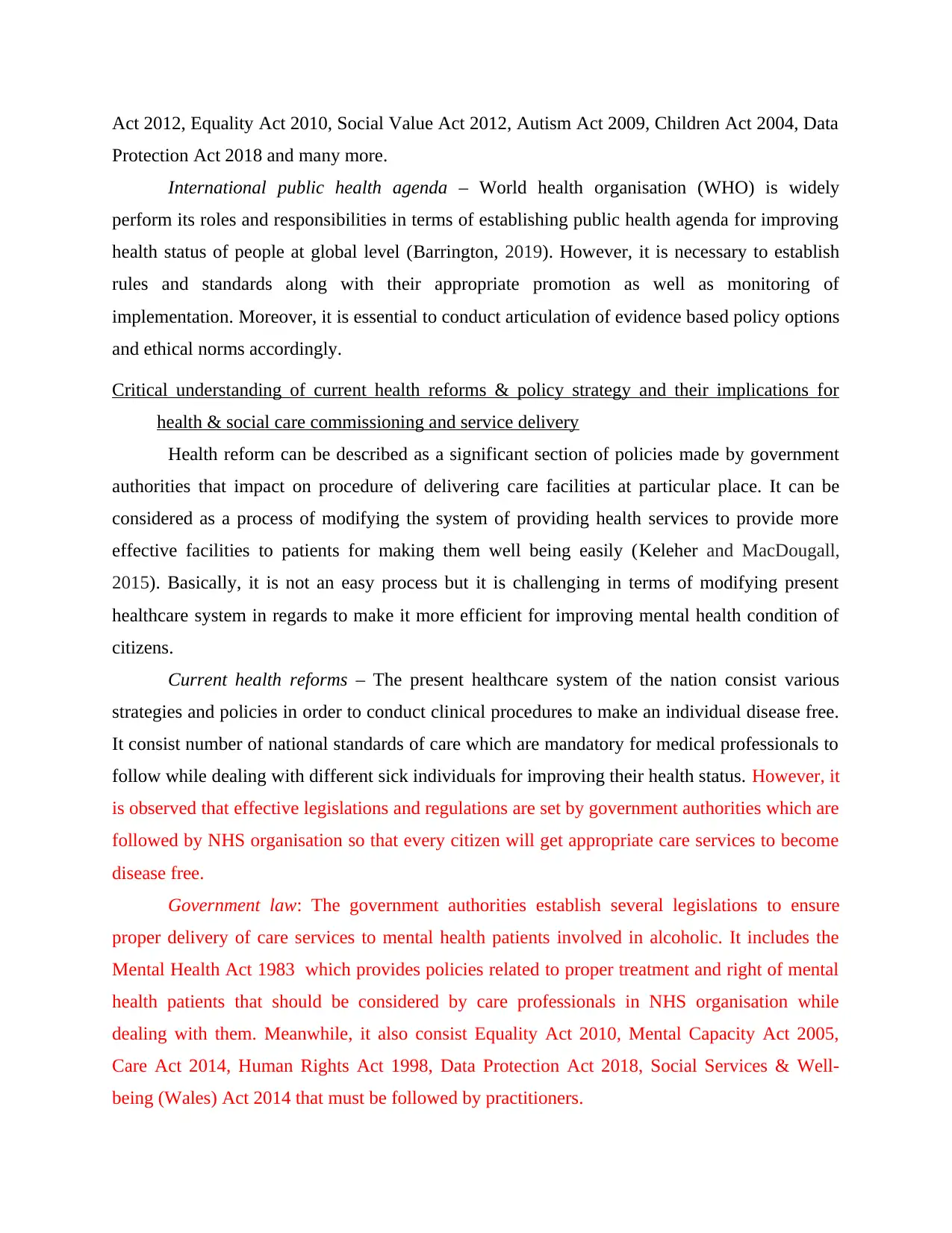
Act 2012, Equality Act 2010, Social Value Act 2012, Autism Act 2009, Children Act 2004, Data
Protection Act 2018 and many more.
International public health agenda – World health organisation (WHO) is widely
perform its roles and responsibilities in terms of establishing public health agenda for improving
health status of people at global level (Barrington, 2019). However, it is necessary to establish
rules and standards along with their appropriate promotion as well as monitoring of
implementation. Moreover, it is essential to conduct articulation of evidence based policy options
and ethical norms accordingly.
Critical understanding of current health reforms & policy strategy and their implications for
health & social care commissioning and service delivery
Health reform can be described as a significant section of policies made by government
authorities that impact on procedure of delivering care facilities at particular place. It can be
considered as a process of modifying the system of providing health services to provide more
effective facilities to patients for making them well being easily (Keleher and MacDougall,
2015). Basically, it is not an easy process but it is challenging in terms of modifying present
healthcare system in regards to make it more efficient for improving mental health condition of
citizens.
Current health reforms – The present healthcare system of the nation consist various
strategies and policies in order to conduct clinical procedures to make an individual disease free.
It consist number of national standards of care which are mandatory for medical professionals to
follow while dealing with different sick individuals for improving their health status. However, it
is observed that effective legislations and regulations are set by government authorities which are
followed by NHS organisation so that every citizen will get appropriate care services to become
disease free.
Government law: The government authorities establish several legislations to ensure
proper delivery of care services to mental health patients involved in alcoholic. It includes the
Mental Health Act 1983 which provides policies related to proper treatment and right of mental
health patients that should be considered by care professionals in NHS organisation while
dealing with them. Meanwhile, it also consist Equality Act 2010, Mental Capacity Act 2005,
Care Act 2014, Human Rights Act 1998, Data Protection Act 2018, Social Services & Well-
being (Wales) Act 2014 that must be followed by practitioners.
Protection Act 2018 and many more.
International public health agenda – World health organisation (WHO) is widely
perform its roles and responsibilities in terms of establishing public health agenda for improving
health status of people at global level (Barrington, 2019). However, it is necessary to establish
rules and standards along with their appropriate promotion as well as monitoring of
implementation. Moreover, it is essential to conduct articulation of evidence based policy options
and ethical norms accordingly.
Critical understanding of current health reforms & policy strategy and their implications for
health & social care commissioning and service delivery
Health reform can be described as a significant section of policies made by government
authorities that impact on procedure of delivering care facilities at particular place. It can be
considered as a process of modifying the system of providing health services to provide more
effective facilities to patients for making them well being easily (Keleher and MacDougall,
2015). Basically, it is not an easy process but it is challenging in terms of modifying present
healthcare system in regards to make it more efficient for improving mental health condition of
citizens.
Current health reforms – The present healthcare system of the nation consist various
strategies and policies in order to conduct clinical procedures to make an individual disease free.
It consist number of national standards of care which are mandatory for medical professionals to
follow while dealing with different sick individuals for improving their health status. However, it
is observed that effective legislations and regulations are set by government authorities which are
followed by NHS organisation so that every citizen will get appropriate care services to become
disease free.
Government law: The government authorities establish several legislations to ensure
proper delivery of care services to mental health patients involved in alcoholic. It includes the
Mental Health Act 1983 which provides policies related to proper treatment and right of mental
health patients that should be considered by care professionals in NHS organisation while
dealing with them. Meanwhile, it also consist Equality Act 2010, Mental Capacity Act 2005,
Care Act 2014, Human Rights Act 1998, Data Protection Act 2018, Social Services & Well-
being (Wales) Act 2014 that must be followed by practitioners.
Paraphrase This Document
Need a fresh take? Get an instant paraphrase of this document with our AI Paraphraser
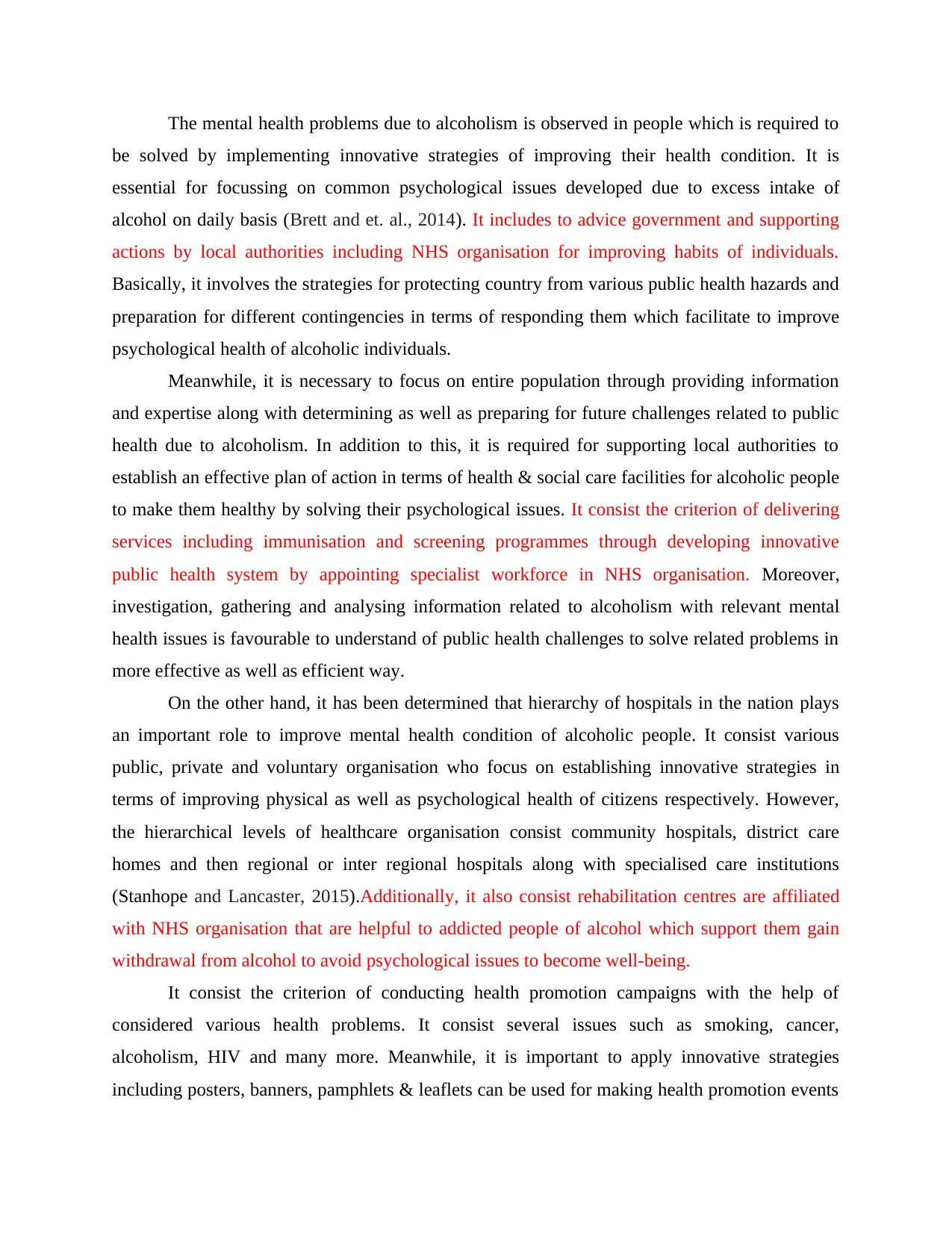
The mental health problems due to alcoholism is observed in people which is required to
be solved by implementing innovative strategies of improving their health condition. It is
essential for focussing on common psychological issues developed due to excess intake of
alcohol on daily basis (Brett and et. al., 2014). It includes to advice government and supporting
actions by local authorities including NHS organisation for improving habits of individuals.
Basically, it involves the strategies for protecting country from various public health hazards and
preparation for different contingencies in terms of responding them which facilitate to improve
psychological health of alcoholic individuals.
Meanwhile, it is necessary to focus on entire population through providing information
and expertise along with determining as well as preparing for future challenges related to public
health due to alcoholism. In addition to this, it is required for supporting local authorities to
establish an effective plan of action in terms of health & social care facilities for alcoholic people
to make them healthy by solving their psychological issues. It consist the criterion of delivering
services including immunisation and screening programmes through developing innovative
public health system by appointing specialist workforce in NHS organisation. Moreover,
investigation, gathering and analysing information related to alcoholism with relevant mental
health issues is favourable to understand of public health challenges to solve related problems in
more effective as well as efficient way.
On the other hand, it has been determined that hierarchy of hospitals in the nation plays
an important role to improve mental health condition of alcoholic people. It consist various
public, private and voluntary organisation who focus on establishing innovative strategies in
terms of improving physical as well as psychological health of citizens respectively. However,
the hierarchical levels of healthcare organisation consist community hospitals, district care
homes and then regional or inter regional hospitals along with specialised care institutions
(Stanhope and Lancaster, 2015).Additionally, it also consist rehabilitation centres are affiliated
with NHS organisation that are helpful to addicted people of alcohol which support them gain
withdrawal from alcohol to avoid psychological issues to become well-being.
It consist the criterion of conducting health promotion campaigns with the help of
considered various health problems. It consist several issues such as smoking, cancer,
alcoholism, HIV and many more. Meanwhile, it is important to apply innovative strategies
including posters, banners, pamphlets & leaflets can be used for making health promotion events
be solved by implementing innovative strategies of improving their health condition. It is
essential for focussing on common psychological issues developed due to excess intake of
alcohol on daily basis (Brett and et. al., 2014). It includes to advice government and supporting
actions by local authorities including NHS organisation for improving habits of individuals.
Basically, it involves the strategies for protecting country from various public health hazards and
preparation for different contingencies in terms of responding them which facilitate to improve
psychological health of alcoholic individuals.
Meanwhile, it is necessary to focus on entire population through providing information
and expertise along with determining as well as preparing for future challenges related to public
health due to alcoholism. In addition to this, it is required for supporting local authorities to
establish an effective plan of action in terms of health & social care facilities for alcoholic people
to make them healthy by solving their psychological issues. It consist the criterion of delivering
services including immunisation and screening programmes through developing innovative
public health system by appointing specialist workforce in NHS organisation. Moreover,
investigation, gathering and analysing information related to alcoholism with relevant mental
health issues is favourable to understand of public health challenges to solve related problems in
more effective as well as efficient way.
On the other hand, it has been determined that hierarchy of hospitals in the nation plays
an important role to improve mental health condition of alcoholic people. It consist various
public, private and voluntary organisation who focus on establishing innovative strategies in
terms of improving physical as well as psychological health of citizens respectively. However,
the hierarchical levels of healthcare organisation consist community hospitals, district care
homes and then regional or inter regional hospitals along with specialised care institutions
(Stanhope and Lancaster, 2015).Additionally, it also consist rehabilitation centres are affiliated
with NHS organisation that are helpful to addicted people of alcohol which support them gain
withdrawal from alcohol to avoid psychological issues to become well-being.
It consist the criterion of conducting health promotion campaigns with the help of
considered various health problems. It consist several issues such as smoking, cancer,
alcoholism, HIV and many more. Meanwhile, it is important to apply innovative strategies
including posters, banners, pamphlets & leaflets can be used for making health promotion events
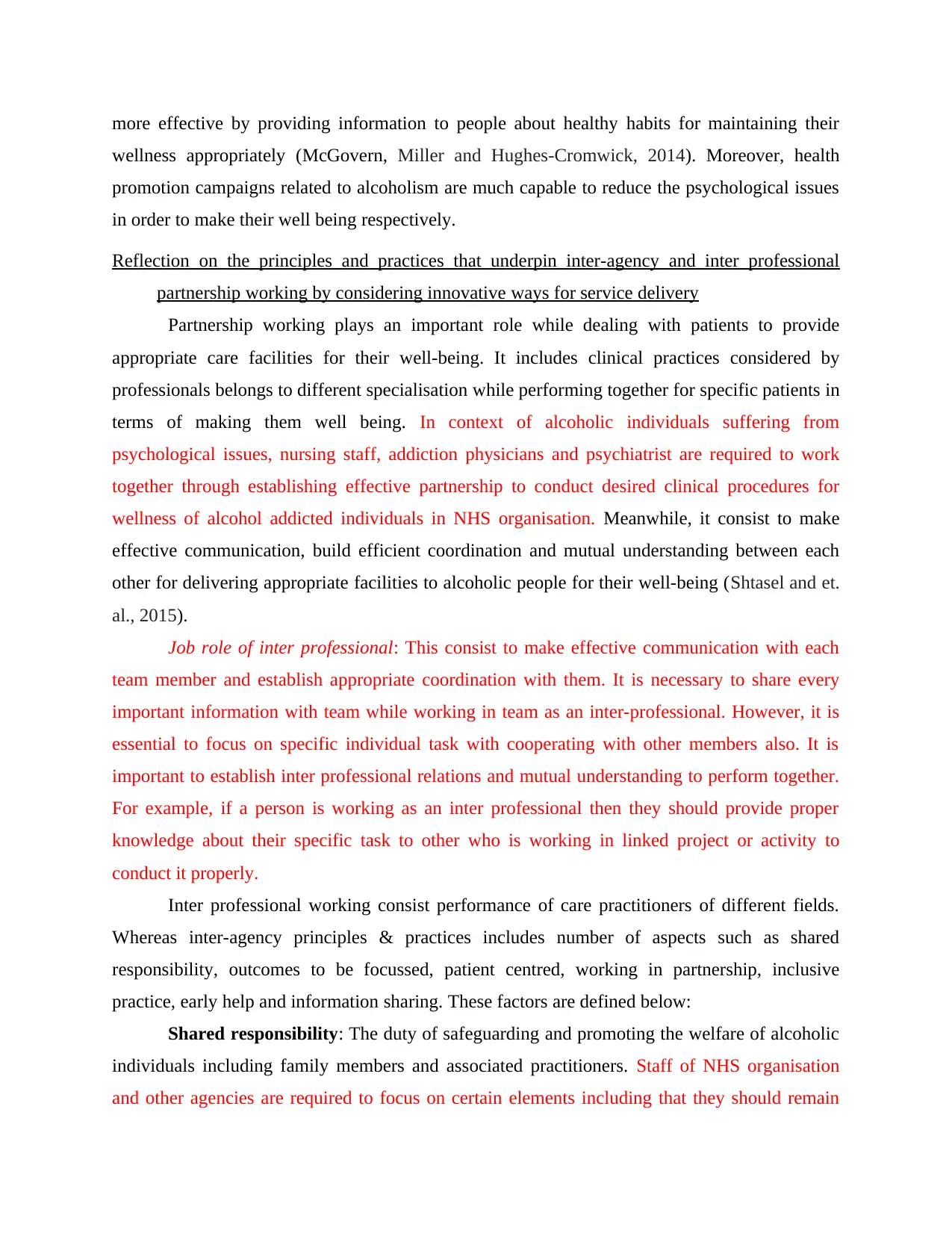
more effective by providing information to people about healthy habits for maintaining their
wellness appropriately (McGovern, Miller and Hughes-Cromwick, 2014). Moreover, health
promotion campaigns related to alcoholism are much capable to reduce the psychological issues
in order to make their well being respectively.
Reflection on the principles and practices that underpin inter-agency and inter professional
partnership working by considering innovative ways for service delivery
Partnership working plays an important role while dealing with patients to provide
appropriate care facilities for their well-being. It includes clinical practices considered by
professionals belongs to different specialisation while performing together for specific patients in
terms of making them well being. In context of alcoholic individuals suffering from
psychological issues, nursing staff, addiction physicians and psychiatrist are required to work
together through establishing effective partnership to conduct desired clinical procedures for
wellness of alcohol addicted individuals in NHS organisation. Meanwhile, it consist to make
effective communication, build efficient coordination and mutual understanding between each
other for delivering appropriate facilities to alcoholic people for their well-being (Shtasel and et.
al., 2015).
Job role of inter professional: This consist to make effective communication with each
team member and establish appropriate coordination with them. It is necessary to share every
important information with team while working in team as an inter-professional. However, it is
essential to focus on specific individual task with cooperating with other members also. It is
important to establish inter professional relations and mutual understanding to perform together.
For example, if a person is working as an inter professional then they should provide proper
knowledge about their specific task to other who is working in linked project or activity to
conduct it properly.
Inter professional working consist performance of care practitioners of different fields.
Whereas inter-agency principles & practices includes number of aspects such as shared
responsibility, outcomes to be focussed, patient centred, working in partnership, inclusive
practice, early help and information sharing. These factors are defined below:
Shared responsibility: The duty of safeguarding and promoting the welfare of alcoholic
individuals including family members and associated practitioners. Staff of NHS organisation
and other agencies are required to focus on certain elements including that they should remain
wellness appropriately (McGovern, Miller and Hughes-Cromwick, 2014). Moreover, health
promotion campaigns related to alcoholism are much capable to reduce the psychological issues
in order to make their well being respectively.
Reflection on the principles and practices that underpin inter-agency and inter professional
partnership working by considering innovative ways for service delivery
Partnership working plays an important role while dealing with patients to provide
appropriate care facilities for their well-being. It includes clinical practices considered by
professionals belongs to different specialisation while performing together for specific patients in
terms of making them well being. In context of alcoholic individuals suffering from
psychological issues, nursing staff, addiction physicians and psychiatrist are required to work
together through establishing effective partnership to conduct desired clinical procedures for
wellness of alcohol addicted individuals in NHS organisation. Meanwhile, it consist to make
effective communication, build efficient coordination and mutual understanding between each
other for delivering appropriate facilities to alcoholic people for their well-being (Shtasel and et.
al., 2015).
Job role of inter professional: This consist to make effective communication with each
team member and establish appropriate coordination with them. It is necessary to share every
important information with team while working in team as an inter-professional. However, it is
essential to focus on specific individual task with cooperating with other members also. It is
important to establish inter professional relations and mutual understanding to perform together.
For example, if a person is working as an inter professional then they should provide proper
knowledge about their specific task to other who is working in linked project or activity to
conduct it properly.
Inter professional working consist performance of care practitioners of different fields.
Whereas inter-agency principles & practices includes number of aspects such as shared
responsibility, outcomes to be focussed, patient centred, working in partnership, inclusive
practice, early help and information sharing. These factors are defined below:
Shared responsibility: The duty of safeguarding and promoting the welfare of alcoholic
individuals including family members and associated practitioners. Staff of NHS organisation
and other agencies are required to focus on certain elements including that they should remain
⊘ This is a preview!⊘
Do you want full access?
Subscribe today to unlock all pages.

Trusted by 1+ million students worldwide
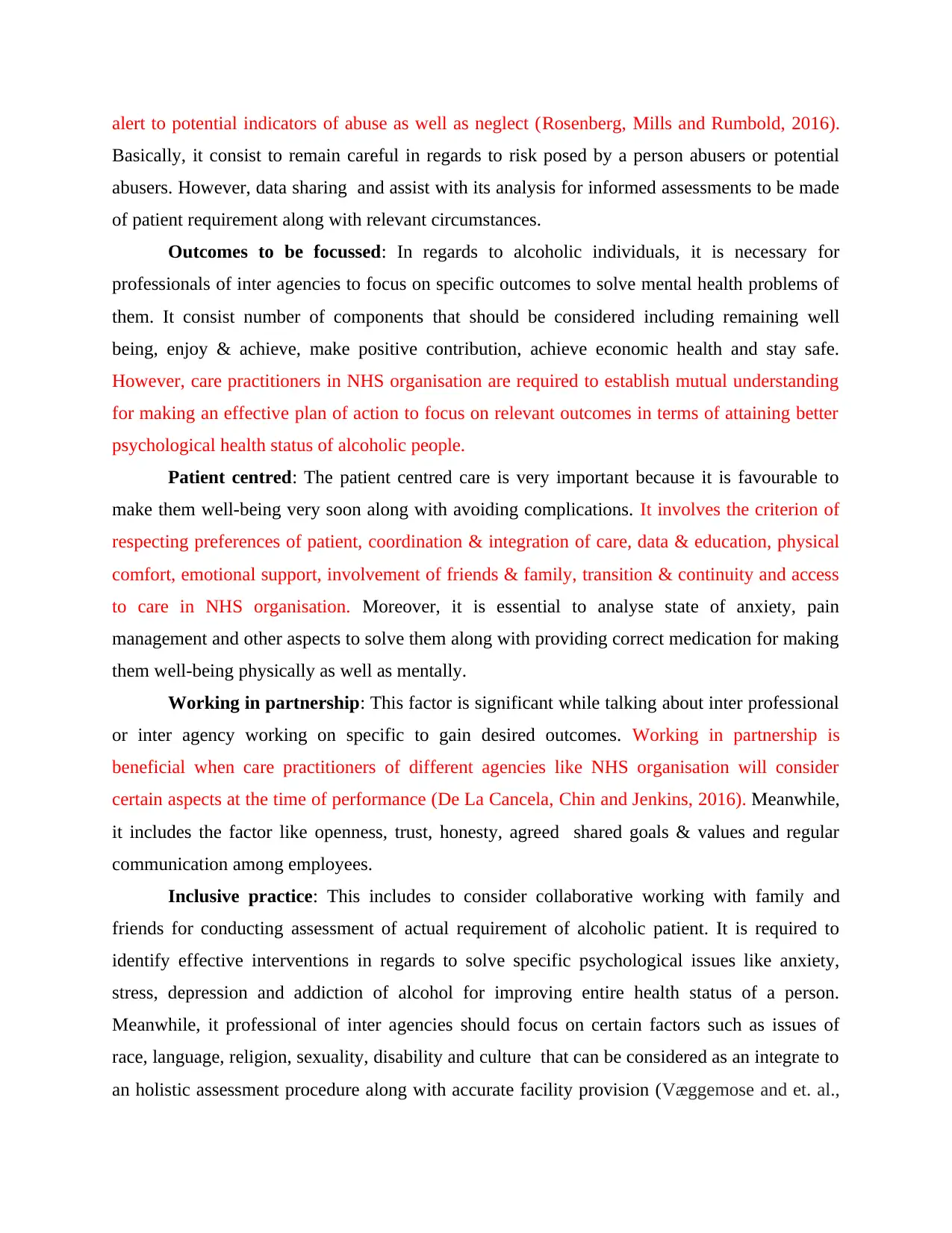
alert to potential indicators of abuse as well as neglect (Rosenberg, Mills and Rumbold, 2016).
Basically, it consist to remain careful in regards to risk posed by a person abusers or potential
abusers. However, data sharing and assist with its analysis for informed assessments to be made
of patient requirement along with relevant circumstances.
Outcomes to be focussed: In regards to alcoholic individuals, it is necessary for
professionals of inter agencies to focus on specific outcomes to solve mental health problems of
them. It consist number of components that should be considered including remaining well
being, enjoy & achieve, make positive contribution, achieve economic health and stay safe.
However, care practitioners in NHS organisation are required to establish mutual understanding
for making an effective plan of action to focus on relevant outcomes in terms of attaining better
psychological health status of alcoholic people.
Patient centred: The patient centred care is very important because it is favourable to
make them well-being very soon along with avoiding complications. It involves the criterion of
respecting preferences of patient, coordination & integration of care, data & education, physical
comfort, emotional support, involvement of friends & family, transition & continuity and access
to care in NHS organisation. Moreover, it is essential to analyse state of anxiety, pain
management and other aspects to solve them along with providing correct medication for making
them well-being physically as well as mentally.
Working in partnership: This factor is significant while talking about inter professional
or inter agency working on specific to gain desired outcomes. Working in partnership is
beneficial when care practitioners of different agencies like NHS organisation will consider
certain aspects at the time of performance (De La Cancela, Chin and Jenkins, 2016). Meanwhile,
it includes the factor like openness, trust, honesty, agreed shared goals & values and regular
communication among employees.
Inclusive practice: This includes to consider collaborative working with family and
friends for conducting assessment of actual requirement of alcoholic patient. It is required to
identify effective interventions in regards to solve specific psychological issues like anxiety,
stress, depression and addiction of alcohol for improving entire health status of a person.
Meanwhile, it professional of inter agencies should focus on certain factors such as issues of
race, language, religion, sexuality, disability and culture that can be considered as an integrate to
an holistic assessment procedure along with accurate facility provision (Væggemose and et. al.,
Basically, it consist to remain careful in regards to risk posed by a person abusers or potential
abusers. However, data sharing and assist with its analysis for informed assessments to be made
of patient requirement along with relevant circumstances.
Outcomes to be focussed: In regards to alcoholic individuals, it is necessary for
professionals of inter agencies to focus on specific outcomes to solve mental health problems of
them. It consist number of components that should be considered including remaining well
being, enjoy & achieve, make positive contribution, achieve economic health and stay safe.
However, care practitioners in NHS organisation are required to establish mutual understanding
for making an effective plan of action to focus on relevant outcomes in terms of attaining better
psychological health status of alcoholic people.
Patient centred: The patient centred care is very important because it is favourable to
make them well-being very soon along with avoiding complications. It involves the criterion of
respecting preferences of patient, coordination & integration of care, data & education, physical
comfort, emotional support, involvement of friends & family, transition & continuity and access
to care in NHS organisation. Moreover, it is essential to analyse state of anxiety, pain
management and other aspects to solve them along with providing correct medication for making
them well-being physically as well as mentally.
Working in partnership: This factor is significant while talking about inter professional
or inter agency working on specific to gain desired outcomes. Working in partnership is
beneficial when care practitioners of different agencies like NHS organisation will consider
certain aspects at the time of performance (De La Cancela, Chin and Jenkins, 2016). Meanwhile,
it includes the factor like openness, trust, honesty, agreed shared goals & values and regular
communication among employees.
Inclusive practice: This includes to consider collaborative working with family and
friends for conducting assessment of actual requirement of alcoholic patient. It is required to
identify effective interventions in regards to solve specific psychological issues like anxiety,
stress, depression and addiction of alcohol for improving entire health status of a person.
Meanwhile, it professional of inter agencies should focus on certain factors such as issues of
race, language, religion, sexuality, disability and culture that can be considered as an integrate to
an holistic assessment procedure along with accurate facility provision (Væggemose and et. al.,
Paraphrase This Document
Need a fresh take? Get an instant paraphrase of this document with our AI Paraphraser
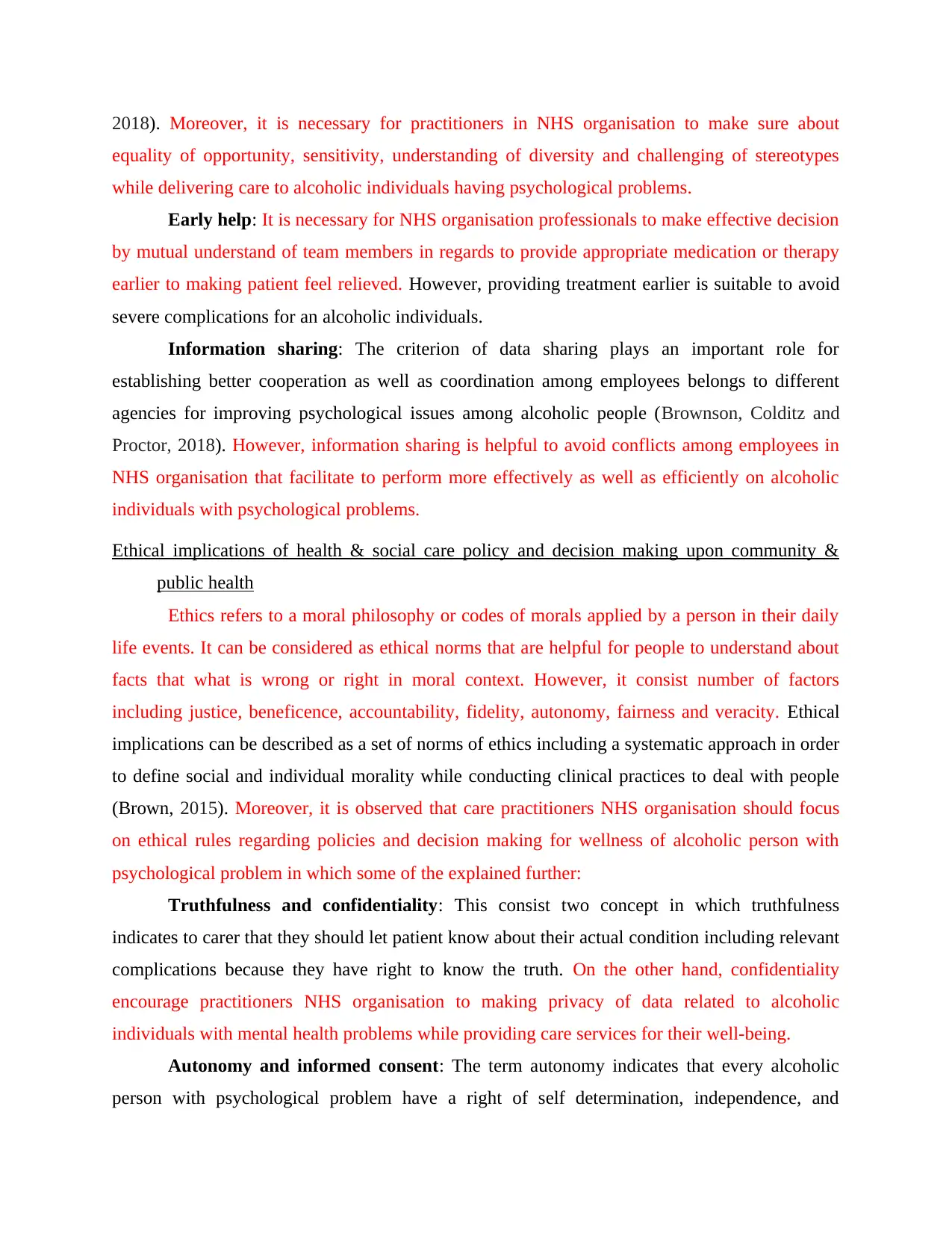
2018). Moreover, it is necessary for practitioners in NHS organisation to make sure about
equality of opportunity, sensitivity, understanding of diversity and challenging of stereotypes
while delivering care to alcoholic individuals having psychological problems.
Early help: It is necessary for NHS organisation professionals to make effective decision
by mutual understand of team members in regards to provide appropriate medication or therapy
earlier to making patient feel relieved. However, providing treatment earlier is suitable to avoid
severe complications for an alcoholic individuals.
Information sharing: The criterion of data sharing plays an important role for
establishing better cooperation as well as coordination among employees belongs to different
agencies for improving psychological issues among alcoholic people (Brownson, Colditz and
Proctor, 2018). However, information sharing is helpful to avoid conflicts among employees in
NHS organisation that facilitate to perform more effectively as well as efficiently on alcoholic
individuals with psychological problems.
Ethical implications of health & social care policy and decision making upon community &
public health
Ethics refers to a moral philosophy or codes of morals applied by a person in their daily
life events. It can be considered as ethical norms that are helpful for people to understand about
facts that what is wrong or right in moral context. However, it consist number of factors
including justice, beneficence, accountability, fidelity, autonomy, fairness and veracity. Ethical
implications can be described as a set of norms of ethics including a systematic approach in order
to define social and individual morality while conducting clinical practices to deal with people
(Brown, 2015). Moreover, it is observed that care practitioners NHS organisation should focus
on ethical rules regarding policies and decision making for wellness of alcoholic person with
psychological problem in which some of the explained further:
Truthfulness and confidentiality: This consist two concept in which truthfulness
indicates to carer that they should let patient know about their actual condition including relevant
complications because they have right to know the truth. On the other hand, confidentiality
encourage practitioners NHS organisation to making privacy of data related to alcoholic
individuals with mental health problems while providing care services for their well-being.
Autonomy and informed consent: The term autonomy indicates that every alcoholic
person with psychological problem have a right of self determination, independence, and
equality of opportunity, sensitivity, understanding of diversity and challenging of stereotypes
while delivering care to alcoholic individuals having psychological problems.
Early help: It is necessary for NHS organisation professionals to make effective decision
by mutual understand of team members in regards to provide appropriate medication or therapy
earlier to making patient feel relieved. However, providing treatment earlier is suitable to avoid
severe complications for an alcoholic individuals.
Information sharing: The criterion of data sharing plays an important role for
establishing better cooperation as well as coordination among employees belongs to different
agencies for improving psychological issues among alcoholic people (Brownson, Colditz and
Proctor, 2018). However, information sharing is helpful to avoid conflicts among employees in
NHS organisation that facilitate to perform more effectively as well as efficiently on alcoholic
individuals with psychological problems.
Ethical implications of health & social care policy and decision making upon community &
public health
Ethics refers to a moral philosophy or codes of morals applied by a person in their daily
life events. It can be considered as ethical norms that are helpful for people to understand about
facts that what is wrong or right in moral context. However, it consist number of factors
including justice, beneficence, accountability, fidelity, autonomy, fairness and veracity. Ethical
implications can be described as a set of norms of ethics including a systematic approach in order
to define social and individual morality while conducting clinical practices to deal with people
(Brown, 2015). Moreover, it is observed that care practitioners NHS organisation should focus
on ethical rules regarding policies and decision making for wellness of alcoholic person with
psychological problem in which some of the explained further:
Truthfulness and confidentiality: This consist two concept in which truthfulness
indicates to carer that they should let patient know about their actual condition including relevant
complications because they have right to know the truth. On the other hand, confidentiality
encourage practitioners NHS organisation to making privacy of data related to alcoholic
individuals with mental health problems while providing care services for their well-being.
Autonomy and informed consent: The term autonomy indicates that every alcoholic
person with psychological problem have a right of self determination, independence, and
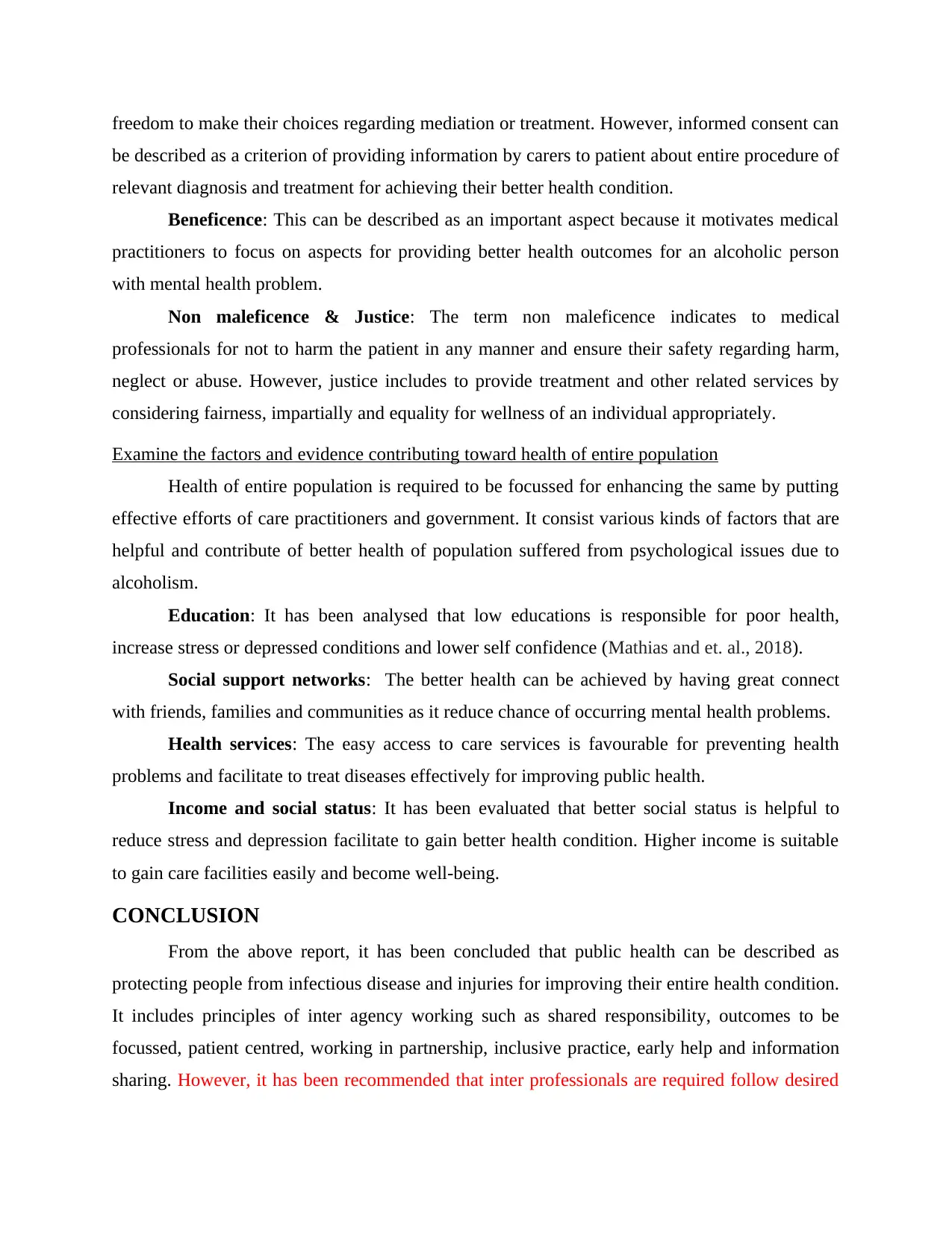
freedom to make their choices regarding mediation or treatment. However, informed consent can
be described as a criterion of providing information by carers to patient about entire procedure of
relevant diagnosis and treatment for achieving their better health condition.
Beneficence: This can be described as an important aspect because it motivates medical
practitioners to focus on aspects for providing better health outcomes for an alcoholic person
with mental health problem.
Non maleficence & Justice: The term non maleficence indicates to medical
professionals for not to harm the patient in any manner and ensure their safety regarding harm,
neglect or abuse. However, justice includes to provide treatment and other related services by
considering fairness, impartially and equality for wellness of an individual appropriately.
Examine the factors and evidence contributing toward health of entire population
Health of entire population is required to be focussed for enhancing the same by putting
effective efforts of care practitioners and government. It consist various kinds of factors that are
helpful and contribute of better health of population suffered from psychological issues due to
alcoholism.
Education: It has been analysed that low educations is responsible for poor health,
increase stress or depressed conditions and lower self confidence (Mathias and et. al., 2018).
Social support networks: The better health can be achieved by having great connect
with friends, families and communities as it reduce chance of occurring mental health problems.
Health services: The easy access to care services is favourable for preventing health
problems and facilitate to treat diseases effectively for improving public health.
Income and social status: It has been evaluated that better social status is helpful to
reduce stress and depression facilitate to gain better health condition. Higher income is suitable
to gain care facilities easily and become well-being.
CONCLUSION
From the above report, it has been concluded that public health can be described as
protecting people from infectious disease and injuries for improving their entire health condition.
It includes principles of inter agency working such as shared responsibility, outcomes to be
focussed, patient centred, working in partnership, inclusive practice, early help and information
sharing. However, it has been recommended that inter professionals are required follow desired
be described as a criterion of providing information by carers to patient about entire procedure of
relevant diagnosis and treatment for achieving their better health condition.
Beneficence: This can be described as an important aspect because it motivates medical
practitioners to focus on aspects for providing better health outcomes for an alcoholic person
with mental health problem.
Non maleficence & Justice: The term non maleficence indicates to medical
professionals for not to harm the patient in any manner and ensure their safety regarding harm,
neglect or abuse. However, justice includes to provide treatment and other related services by
considering fairness, impartially and equality for wellness of an individual appropriately.
Examine the factors and evidence contributing toward health of entire population
Health of entire population is required to be focussed for enhancing the same by putting
effective efforts of care practitioners and government. It consist various kinds of factors that are
helpful and contribute of better health of population suffered from psychological issues due to
alcoholism.
Education: It has been analysed that low educations is responsible for poor health,
increase stress or depressed conditions and lower self confidence (Mathias and et. al., 2018).
Social support networks: The better health can be achieved by having great connect
with friends, families and communities as it reduce chance of occurring mental health problems.
Health services: The easy access to care services is favourable for preventing health
problems and facilitate to treat diseases effectively for improving public health.
Income and social status: It has been evaluated that better social status is helpful to
reduce stress and depression facilitate to gain better health condition. Higher income is suitable
to gain care facilities easily and become well-being.
CONCLUSION
From the above report, it has been concluded that public health can be described as
protecting people from infectious disease and injuries for improving their entire health condition.
It includes principles of inter agency working such as shared responsibility, outcomes to be
focussed, patient centred, working in partnership, inclusive practice, early help and information
sharing. However, it has been recommended that inter professionals are required follow desired
⊘ This is a preview!⊘
Do you want full access?
Subscribe today to unlock all pages.

Trusted by 1+ million students worldwide
1 out of 14
Related Documents
Your All-in-One AI-Powered Toolkit for Academic Success.
+13062052269
info@desklib.com
Available 24*7 on WhatsApp / Email
![[object Object]](/_next/static/media/star-bottom.7253800d.svg)
Unlock your academic potential
Copyright © 2020–2025 A2Z Services. All Rights Reserved. Developed and managed by ZUCOL.





